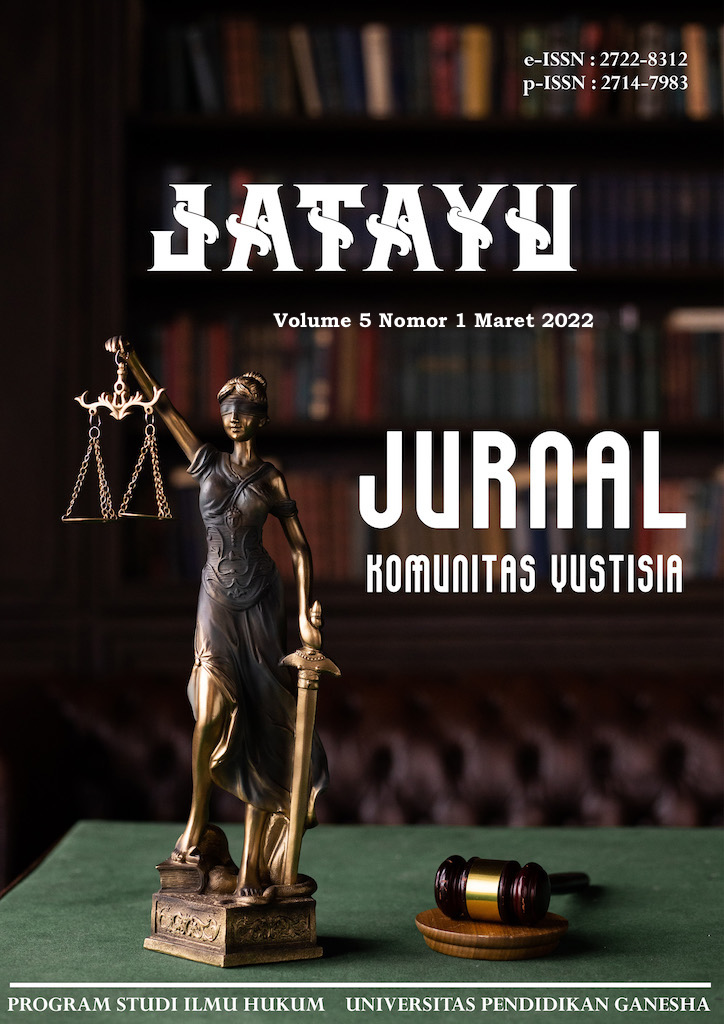PENYELESAIAN SENGKETA DAGANG INTERNASIONAL ATAS KEBIJAKAN REPORT PALM OIL OLEH UNI EROPA TERHADAP INDONESIA DITINJAU DARI WORLD TRADE ORGANIZATION
DOI:
https://doi.org/10.23887/jatayu.v5i2.51453Keywords:
Prinsip Most Favuored Nation, Penyelesaian Sengketa Dagang, CPOAbstract
Penelitian ini mempunyai tujuan untuk mengetahui dan menganalisa pengaturan CPO dalam ketentuan WTO, serta untuk mengetahui dan menganalisa proses penyelesaian sengketa antara Indonesia dan Uni Eropa mengenai kebijakan report palm oil menurut ketentuan WTO. Guna menjawab rumusan permasalahan dalam penelitian ini, digunakan jenis penelitian hukum normatif yang mengkaji tentang pengaturan CPO termasuk implementasi prinsip MFN dalam WTO dan menganalisis proses penyelesaian sengketa antara Indonesia dan Uni Eropa mengenai kebijakan pemboikotan minyak kelapa sawit. Digunakan pula jenis pendekatan hukum perundang-undangan, konseptual, dan kasus yang mana data-data tersebut dikumpulkan dengan teknik studi dokumen dan dianalisa dengan teknik deskriptif kualitatif. Melalui metode penelitian tersebut diperoleh hasil bahwa kebijakan-kebijakan yang dikeluarkan Uni Eropa terhadap Indonesia atas pemboikotan CPO telah dibantah pemerintah Indonesia melalui sertifikasi berupa RSPO, ISCC, SAN dan ISPO. Sertifikasi tersebut harus dilaksanakan dengan prinsip non-diskriminasi (MFN). Dalam praktiknya di lapangan, penerapan prinsip MFN dalam perdagangan internasional sering kali tidak dapat berjalan dengan mudah. Hal tersebut dapat dilihat dari kasus pemboikotan CPO oleh Uni Eropa terhadap Indonesia, yang mana RED II dianggap melanggar prinsip MFN termasuk mendiskriminasi CPO Indonesia dari minyak nabati lainnya. Penyelesaian sengketa di WTO dapat diselesaikan melalui lembaga DSB. Terkait sengketa pemboikotan CPO yang dilakukan Uni Eropa, Indonesia dapat melakukan beberapa upaya yaitu dengan tindakan yang sifatnya power based, tindakan yang sifatnya right based, serta tindakan yang sifatnya interest based.
Downloads
Published
Versions
- 2022-10-24 (2)
- 2022-08-26 (1)
Issue
Section
License

This work is licensed under a Creative Commons Attribution-ShareAlike 4.0 International License.
Authors who publish with this journal agree to the following terms: Authors retain copyright and grant the journal right of first publication with the work simultaneously licensed under a Creative Commons Attribution License that allows others to share the work with an acknowledgement of the work's authorship and initial publication in this journal. Authors are able to enter into separate, additional contractual arrangements for the non-exclusive distribution of the journal's published version of the work (e.g., post it to an institutional repository or publish it in a book), with an acknowledgement of its initial publication in this journal. Authors are permitted and encouraged to post their work online (e.g., in institutional repositories or on their website) prior to and during the submission process, as it can lead to productive exchanges, as well as earlier and greater citation of published work (See The Effect of Open Access). Authors who publish with this journal agree to the following terms: Authors retain copyright and grant the journal right of first publication, with the work [SPECIFY PERIOD OF TIME] after publication simultaneously licensed under aCreative Commons Attribution License that allows others to share the work with an acknowledgement of the work's authorship and initial publication in this journal. Authors are able to enter into separate, additional contractual arrangements for the non-exclusive distribution of the journal's published version of the work (e.g., post it to an institutional repository or publish it in a book), with an acknowledgement of its initial publication in this journal. Authors are permitted and encouraged to post their work online (e.g., in institutional repositories or on their website) prior to and during the submission process, as it can lead to productive exchanges, as well as earlier and greater citation of published work (See The Effect of Open Access).






